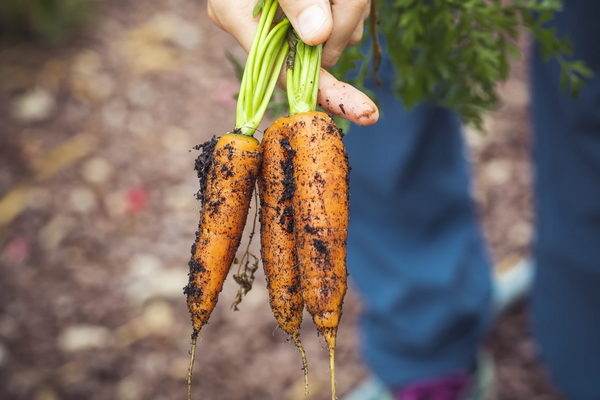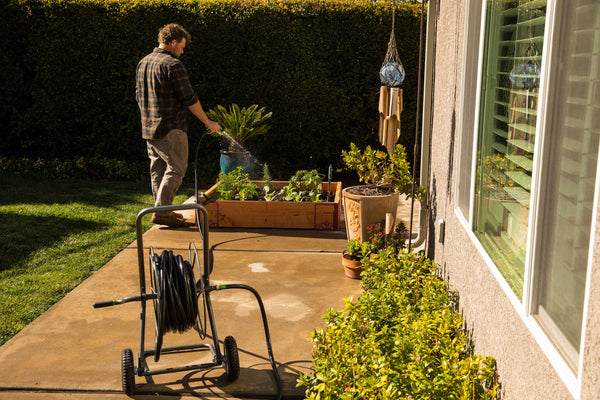Each year, the world gathers on April 22 to celebrate the birth of the modern environmental movement, which began half a century ago in 1970. It’s a day to raise awareness and take action around climate change and other environmental issues, while also celebrating our beautiful planet.
This year, we’ll be taking to our gardens to celebrate, because environmental stewardship begins in our own backyards. Here are some ideas we’ve gathered for how to celebrate the 51st Earth Day in your garden:
1. Grow your own food

Global food production is responsible for nearly a quarter of our total greenhouse gas emissions. When we grow our own food, we reduce the environmental impact of that production by eliminating the need for transportation, processing, and packaging. We also have control over the way our food is grown (organically, water wise), and the type of food we grow (not a monoculture).
2. Compost
Composting is good for the planet in so many ways. For starters, did you know that 76 billion pounds of food end up in landfills every year in the United States? That’s 22% of our total waste! Composting our food scraps (and our leaves, clippings, and other garden debris) is a great way to reduce landfill-generated greenhouse gas emissions, which contribute to climate change.
Using compost also has major benefits for your soil. It helps your soil retain water, reduces the need for chemical fertilizers, and promotes higher crop yields by supplying the nutrients that make plants thrive. Notice how all those things are good for your wallet, too!
3. Keep your soil healthy

Here’s three things you can do to help keep your soil healthy:
- Embrace cover crops. Barren soil is sad soil. Plant cover crops like clover in between seasons to add organic, nutrient rich matter to your soil.
- Rotate your crops. Switch it up! Different plants take up different nutrients within the soil. Vary the types of plants in your garden and try not to plant the same thing in the same place year over year.
- Chill on the till. When you expose your soil to air and sun, you’re reducing its moisture content and releasing previously sequestered carbon into the air. Unless you have sticky clay, heavily compacted soil, or need to adjust soil acidity, try to keep your tilling to a minimum and allow your rich topsoil to stay put without disruption.
4. Grow organic
Chemical fertilizers, pesticides, herbicides, and fungicides all pose a toxic threat to garden critters. But their potential for harm goes far beyond your garden. Thanks to runoff and winds, these toxic compounds can reach our fresh and marine ecosystems, too. When excess nutrients from agricultural fertilizers reach the water, it can lead to a process known as eutrophication, which can end up killing aquatic organisms like fish and crabs.
5. Use less water

- Ditch the sprinkler. Instead, grab your trusty hose for some hand watering or opt for drip irrigation.
- Water smart. Plan to water your lawn or garden during cooler times of day, otherwise you’ll risk losing water to evaporation.
- Capture water. Rain barrels are great for capturing water that you can use later on your lawn, garden, or indoor plants.
6. Make pollinators happy

- Plant some milkweed. The caterpillars that become monarch butterflies feed exclusively on milkweed, so by planting some in your garden, you’re providing much needed habitat for this threatened species. However, make sure that you're buying native milkweed to your region, or you may end up killing more monarchs than you are saving.
- Build a condo and go wild. Drill some holes into some scrap lumber for bees and other pollinators to shelter in. And if you can, create a “wild” zone of your garden where ground-nesting bees can take refuge without being disturbed (yes, this means no mowing, leaf clearing, or spraying!).
- Choose native plants. They’ll grow better and will be like a magnet for local bees and other native pollinators.
Even if you only have a small balcony space, you can still create a beautiful pollinator haven with a hanging garden. And don’t forget the birds! You’ll be amazed at how much life a little bird house or hummingbird feeder can attract.
7. Promote gardening in your community
There are so many benefits of community gardening, including offering a space for you to try out all of the above Earth-friendly garden practices. Plus, celebrating our beautiful planet is more fun when we do it together! This Earth Day, consider writing to your local government encouraging them to dedicate space and resources to community gardens in your area.
Happy Earth Day!
The opportunities to celebrate Earth Day are endless, but we hope this list has given you some inspiration to get started. And of course, don’t forget that environmental stewardship isn’t just for Earth Day. You can do all of these things every day in your garden.
We’d love to see what other ideas you came up with! Show us how you celebrated Earth Day by tagging us on Instagram, Facebook, or Twitter.






